


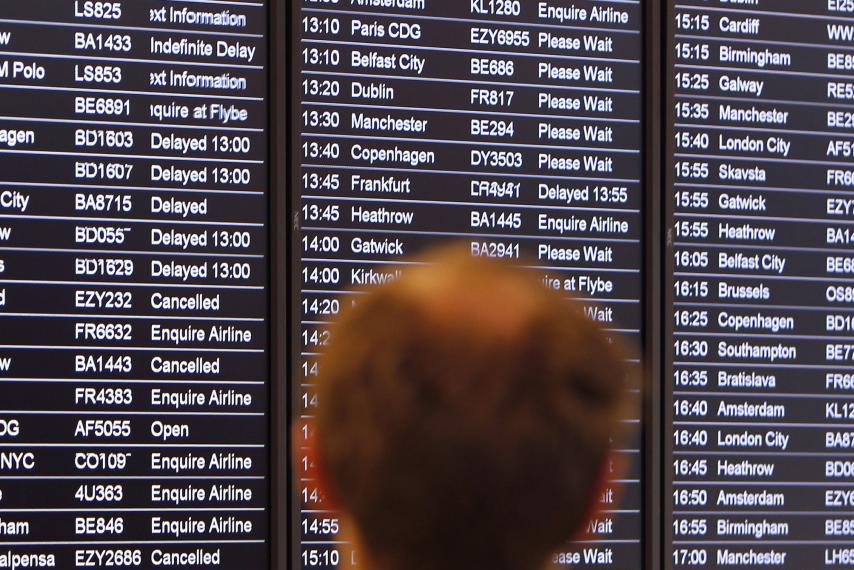

Over the past week, Delta Air Lines has encountered epic travel delays after unprecedented storms forced the cancellation of thousands of flights.
This weekend, my family and I profited from Delta’s travel woes — big time. We made $11k. Here’s how we did it and why I’m not such a snob about getting bumped any more.
I travel a lot for my career, and when I’m headed somewhere, I want to get there. As a travel editor, I’ve run stories about people who make a profession out of getting bumped by the airlines. And yet, I’ve always quietly scoffed at travelers who would give up a seat on a flight in exchange for a voucher. Not my thing.
On Friday morning, I was flying from New York City to Florida with my husband and daughter. The bad weather had passed, so I thought we had escaped the wrath.
After hours of delays, Delta Airlines started offering money for volunteers to give up their tickets on our overbooked flight, which had 60 (sixty!) standby passengers hoping to get a seat. I didn’t flinch. My husband and daughter and I were headed to Fort Lauderdale to see our relatives, and — as far as I was concerned — nothing would hold us back.
When the compensation for volunteers got to $900 a ticket in gift cards (American Express, Target, Macy’s and so on), my husband convinced me to consider the offer. I thought it was too low to delay our vacation, but our plans were flexible, so I said I was open to the idea. My husband approached the gate agent and offered to give up our seats for $1,500 apiece. She countered: $1,350 each.
Other frustrated passengers were yelling at the staff and crying over vexed travel plans. Somehow, when an airline is offering you and your family $4,050, missing a flight doesn’t seem so bad. We could have also scored a free hotel room near the airport and complimentary dinner, but we live about 20 minutes from LaGuardia, so we volunteered to give up our seats and headed home with a big chunk of change in American Express gift cards and confirmed seats for a Saturday flight.
I have been a loyal Delta customer for years. The airline has one of the best track records in the industry. In fact, CNN recently reported that Delta went 161 straight days without a cancellation in 2016 — including disruptions due to both maintenance and weather.
The staff handled the situation seamlessly and professionally. My husband and I kept saying to each other: “This was the best travel day ever!” Making more than $4,000 on Friday didn’t hurt, mind you.
When I went to check in online on Saturday and saw that the flight was delayed by more than an hour and that Delta was already asking for volunteers to give up their seats, I turned to my husband and said, “Cha-ching!”
Indeed, when we got to the airport, the airline started offering money to volunteers…$300…$600…$900…$1,000…$1,300. Bingo! We took the offer. The airline ended up giving us two gift cards at $1,300 each and (surprise!) a third at $1,350. Delta also threw in lunch ($15 each) and round-trip taxi fare (worth about $50). That’s more than $4,000, if you factor in everything. The airline assured us that we would get confirmed seats on Sunday.
I felt a bit guilty making so much money off the situation, but other passengers pointed out that we were freeing up seats for people who really needed to get somewhere. Many passengers actually thanked us for doing this.
After our flight departed, we waited. And waited. And waited. But the airline was still struggling to figure out the rebooking and get us three confirmed seats the next day. We found out that standby passengers were being told that Delta flights to Florida were fully booked (in fact, overbooked) until Tuesday. We were drained, and suddenly our long-weekend trip was looking far less appealing.
So when we suggested to the gate agent that we might be open to volunteering our seats again by cancelling the trip altogether, the offer was met with smiles and another $1,000 per person in advance compensation. Delta sweetened the deal by refunding the cost of the three plane tickets. We accepted Delta’s offer and went home, sad to miss our trip, but not so sad about the lucrative results.
Granted, it didn’t work out for many other travelers. Over the course of two days, we heard horror stories about families with little kids sleeping at the airport and people missing weddings and funerals. No gift card will compensate for life interruptions like that. (And my own father is still stuck in Indianapolis as I write this.) But we can’t complain.
Do the math — my family and I were given exactly $11,000 in American Express gift cards, plus a little extra in food and taxi vouchers. And because we were staying with family and didn’t need to cancel a hotel or car rental, it didn’t cost us anything besides our time (and a missed trip).
A recent study from MileCards.com analyzed data from the Department of Transportation’s March 2017 Air Travel Consumer Report and determined that Delta is the airline most likely to pay people for volunteering their seats, compensating 10 out of every 10,000 bumped passengers. But according to the Department of Transportation, it’s pretty rare: In 2016, only 6.6 out of every 10,000 passengers became volunteers who earned compensation for taking another flight or cancelling their plans.
Still, one gate agent confessed that there are people who take the art of bumping very seriously and make thousands upon thousands of dollars. And now, I understand it. I really do. I’m already starting to think about how I can get bumped off other flights. This could be a new career.
Read on for 10 things to know about getting bumped from a plane, some ways to increase your chances — and how to get compensated handsomely. And for more tips on how to game the airlines, check out these tips from professional travel hackers.
1. Consider the timing. Airlines routinely overbook flights with the assumption that a certain percentage of passengers will cancel. Flights during busy travel seasons (hello spring break!) and the last flight of the day are more likely to be overbooked. In that case, the airline will ask for volunteers to give up their seats or bump passengers to another flight.

2. Know your rights. The U.S. Department of Transportation requires airlines to compensate you by law if you’re bumped off a plane, even if you’re bumped involuntarily. Insist on being paid. If your delay doesn’t exceed an hour and the airline puts you on another flight, you’re not entitled to compensation. Be aware that the rules go out the window with weather-related delays or delays for safety reasons; rules also vary outside the U.S. Whatever you do, don’t arrive at your gate late. The airlines can use this as a way to avoid compensating you. I saw this happen to a family of four who lingered at the restaurant too long and lost their seats when they weren’t at the gate 15 minutes before departure time. The airline gave away their seats to people on the standby list. No gift cards for them. (And probably no vacation, either.)
3. Do your research. If your flight still has available seats, it probably won’t get overbooked. If the flight is close to full or sold out, there are increased odds that the airline will bump passengers.
4. Ask! When you get to the gate, head straight to the agent and see if the airline is looking for volunteers. Tell them you only want to give up your seat for a good offer.
5. Don’t stray too far from the podium. You don’t want to miss the call for volunteers and you want to be the first person to volunteer when the gate agent offers a good figure.
6. Be careful. A guy on one of our flights said he might be interested in volunteering when he wasn’t really sure. The gate agent took that at face value and gave his seat away. He changed his mind and regretted it, but it was too late. If the airline doesn’t end up needing as many seats, it can also break up families. Once you volunteer, the airline can take away your seat — and make your partner or child fly without you.
7. Don’t get too greedy. Some airlines (as we encountered with Delta) conduct auctions. The airline will give preference to people who volunteer for less.
8. Consider the form of compensation. Some airlines offer travel vouchers; some offer cash or gift cards. Think about what makes most sense. Some flight vouchers expire within a year; some gift cards expire even sooner. Cash is the best bet, if you can get it.
9. Don’t check luggage. My suitcase went to Fort Lauderdale without me. Same thing happened to another family, whose luggage was filled with frozen Passover dishes (they said that their $5,000+ in compensation was sufficient to let the food spoil). The airline says I will get my suitcase back, and I am hopeful. Lesson learned: Fly with carryon bags. It makes it easier if you get rerouted or cancel the flight.
10. Above all, be nice! After hanging out at the counter for hours and hours over the course of two days, I began to notice some trends. Screaming doesn’t work. Crying doesn’t work. Being nice? Now, that works. My husband bought lunch for a couple of gate agents who mentioned that they had worked through their break. I brought water to another agent who said he had come to work at 3 a.m. to help out and was dehydrated. These airline employees went above and beyond to help us out. And that’s good karma.
Update: On 4/10/17, statistics from the Department of Transportation’s March 2017 Air Travel Consumer Report were added to this story.
Thanks for stopping by, come back again, John Free Range Explorer.
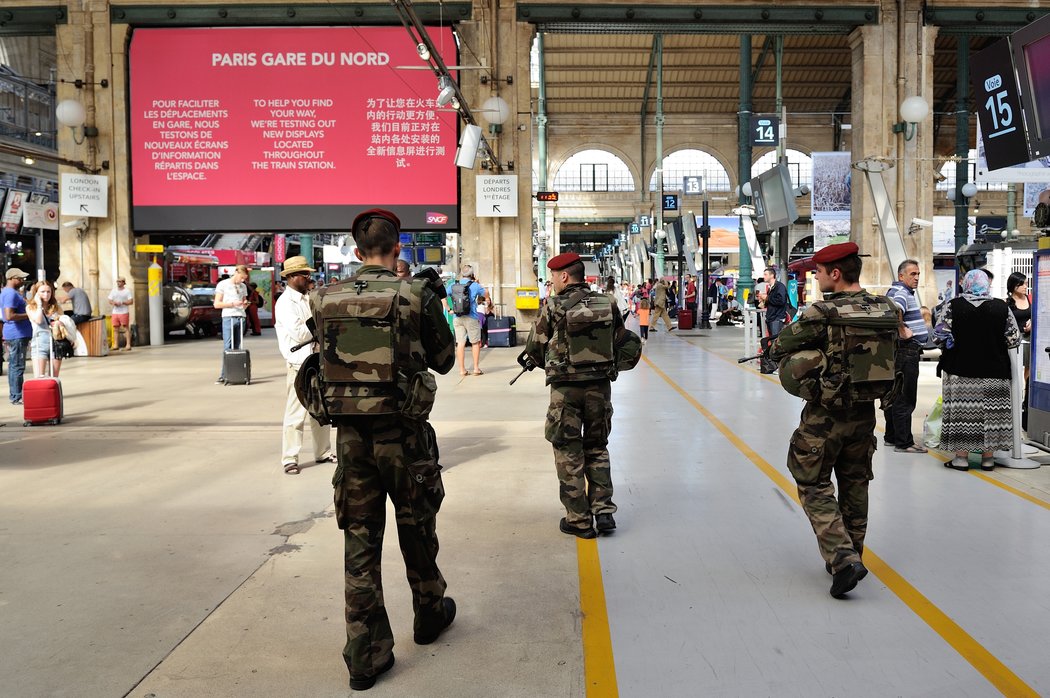
We all love to Travel. And we should continue to travel worldwide. However, we must become more ALERT AND AWARE OF OUR SURROUNDINGS at all times, whether we’re at home or traveling. It’s just another element of traveling these days.
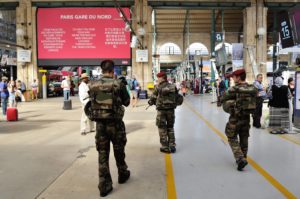 Terrorists want to make as big an impact as possible so be careful driving or walking into any place that has large crowds or anywhere that might be of historic, political/governmental or infrastructural significance. If you can, visit at less crowded time of day or year.
Terrorists want to make as big an impact as possible so be careful driving or walking into any place that has large crowds or anywhere that might be of historic, political/governmental or infrastructural significance. If you can, visit at less crowded time of day or year.
It’s wise to take an assessment of the area as you approach it. If it’s too crowded, or doesn’t look of feel right, listen to your intuition, don’t go any farther. An ounce of precaution can save your trip and your life.
So, be ALERT and AWARE and keep traveling to your dream destinations.
Here are 10 tips from Oyster.com to help you prepare for your travels.
(This post is originally from https://www.oyster.com)
When it comes to travel in 2017, 84 percent of people said they are somewhat concerned about their safety, according to a recent survey conducted by Global Rescue, a provider of medical, security, evacuation, and travel risk management services. Not surprisingly, Europe, along with Africa and the Middle East, has emerged as a top-three destination in terms of concern level.


Precautionary measures should begin before you book your trip. The first and foremost thing a traveler should do is check for safety advisories on the destination. Head to travel.state.gov to familiarize yourself with the current conditions in the country, and load up on other country-specific information, such road safety and entry requirements. If you see a travel warning or alert, the U.S. State Department recommends reconsidering or postponing travel to the destination. “There are plenty of places that have travel warnings and have pockets that are safe, but for the most part, we recommend reconsidering if that’s the destination you want to visit,” says Aguilera. “Carefully read those travel warnings because each one is different. It’s tailored to the situation on the ground — some are for high crime, and some are based on the possibility of being kidnapped. Everyone’s comfort level is different — and our goal is to inform.”
Once you’ve picked your destination, Aguilera recommends registering in the Smart Traveler Enrollment Program (STEP). This provides travelers with localized real-time updates and security announcements. It also offers information on demonstrations and protests, so you can plan accordingly. Should something occur, travelers will be notified on which areas to avoid.
It’s crucial to share your itinerary with your loved ones, including where you’re going, who you’re traveling with, and where you’re staying, so they may reach you in the event of an emergency. Don’t forget to communicate any changes to travel plans, too.
If you can, take a direct flight instead of stopping in a place that may have a travel warning, Aguilera suggests. Another tip: Minimize the time spent in areas of the airport where it’s less protected, and make sure you get to a secure area as quickly as possible. “Based on the terrorist incidents in the last couple of years, the [attacks] have happened outside the secure area,” she says. Hume also recommends using a taxi or ride sharing service to reduce exposure to crowds and large gatherings while traveling within a city.
Beyond location, vacationers should also consider when they’re traveling. Plan a trip when it may be less frequented by tourists, Aguilera suggests. “Terrorists want to have a high value impact,” she says. Visiting during an off-peak season means your surroundings will likely be less congested. Last but not least, consider the hotel — make sure to choose a property that has high security standards, as well as Wi-Fi.
Before you go, make a note of where the safe havens are located — police stations, hotels, and hospitals, to name a few. If you’re traveling with other loved ones, formulate a plan of action in the event that you are separated and cell coverage is spotty. Pick a designated meeting spot and time, Aguilera suggests. Hume also notes that establishing and reviewing a rally point with travel companions each day can be helpful. Of course, knowing the layout of a city is also vital.
“Always have local currency and an ATM or credit card available. This will allow you to pay for transportation and other needs in the event of an emergency,” says Hume. Hume also recommends carrying a paper map in case cell service or internet connection is limited and you need to navigate the city. Ensure your travel companions are using the same map. Local maps are often provided by hotels.
Part of preparing also means investing in insurance. “Each traveler should look at the fine print as to what they’re getting insured,” says Aguilera. “When you purchase an airline ticket, they might insure you to return without any penalties or fees in case of an incident. There’s also insurance to be medevacked out in case of a medical emergency. Medical insurance is perhaps the most important thing that people should consider spending an extra few dollars on.” As medical evacuations can be a costly procedure, it’s best to be safe.
Travelers will have two options if they find themselves in the midst of a crisis or terrorist attack. Assess the situation — if you’re not immediately in the vicinity of the attack, run, Aguilera says. If there’s a shooter in place, drop to the floor or get as low as possible in order to get out of the line of fire. Once you know the danger has passed (and you’re not harmed), get to safe place — a hotel nearby, friend’s house, police station, hospital — as soon as possible.
“If a traveler should find themselves in a dangerous situation, remember to move away from the area as quickly and safely as possible. Follow all instructions from emergency personnel, and do not attempt to return to the scene to help or gawk. Remember that your life is not worth recovering luggage or capturing a cell phone video,” says Hume.
Aguilera advises that everybody tune into the local media to find out what the local authorities are saying. They will likely advise you as to the next best steps to take, whether it’s to stay put or avoid transportation.
“We recommend taking the phone number of the closest embassy to you, so you’re able to call if you’re injured,” says Aguilera. That being said, the embassy will focus on those who are injured. It’s important to have a plan to communicate with someone back home. “If you are safe and physically unhurt, call your loved ones,” says Aguilera. “During an emergency, cell phone service can be spotty and landlines can be locked, so get word back to your family members.”
Consider a satellite phone or utilize and internet connection to communicate via email, messaging app, or social media, Hume suggests. But make sure to have another way to communicate as well. “Cellular networks can become quickly overwhelmed, as was the case in Brussels and Paris immediately following the attacks, so having alternate means of communication is a must,” says Hume.
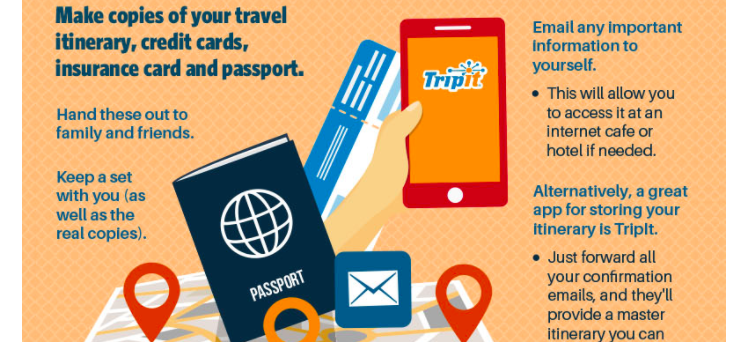
Traveling the world these days has become more dangerous in some areas. As always it’s important to be aware and vigilant of everybody and everything around you.
Here’s an info-graphic and great article to help you to travel safely. Don’t stop traveling, just be more aware now days.
Thanks for stopping by, John

Banksy, a street artist that remains anonymous has blessed Park City, Utah with one of his works. It’s on Main Street in an alley, outside Java Cow Cafe and Bakery, 402 Main. It was created something during the 2010 Sundance Film Festival.
Unfortunately, the protective glass covering it and another site were damaged by unknown vandals. Local TV station KSL filed this report when it happened in 2014.
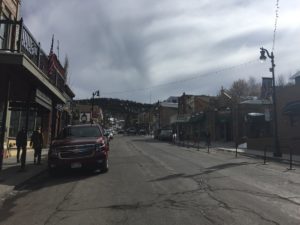


Enjoy Utah, thanks, John


Winter brings the American Bald Eagles to the wetlands of Northern Utah.
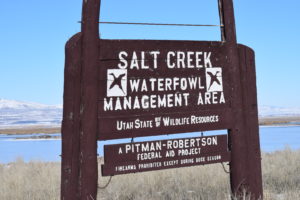
A great viewing area is the Salt Creek Waterfowl Management Area west of Corrine, Utah. Be prepared for it to be wet, cold and windy. Dress warmly.
Bring binoculars, a telescope or good camera with a long lens. It should be longer than the 200mm (too short) I used to take these photographs. Preferable, at least 300mm. Enjoy your outing.



All photos © John McFadden 2017.

Being around water and listening to it has been proven to be restful and helpful to many people. In fact, water is the only way they can relax and feel like they’re in their natural environment.
Last fall I recorded this waterfall at Lisa Falls in Little Cottonwood Canyon, Utah.
Enjoy this short break from stress.

We took a quick trip to Sedona to get away from the nasty inversion, cold temperatures and piled up snow in Utah. The weather in Sedona was better than ours, but we still experienced rain and snow. Even so, Sedona didn’t let us down. The Red Rocks with a powdered sugar like snow on them looked gorgeous . However, with so little sunshine it was difficult to make great photos.
We had hoped to spend our first night at the ARIZONA BILTMORE WALDORF ASTORIA RESORT in Luxury. We liked it so much previously, we were looking for another pleasant stay. Unfortunately, they were sold out because of the Barret-Jackson auto auction. We met a guy who was in town to bid and buy a Lamborghini, in other words a high roller and he had to stay at a Residence Inn. There will be other chances for us to stay at the great Frank Lloyd Wright inspired hotel.

Instead, we drove north to Sedona for 3 days. It was beautiful.

Our special treat was lunch at the Enchantment Resort in the TII Gavo Southwestern restaurant. The atmosphere is casual southwestern with floor to ceiling windows looking out to the red rocks up close and personal (see photo below). The food presentation was beautiful and appealing. We enjoyed the Clam Chowder and Grilled Salmon with tasty local flavorings.





Because of the weather we did our site seeing by car exploring. Schnebly Road gave us beautiful views and muddy, rocky, bumpy road.
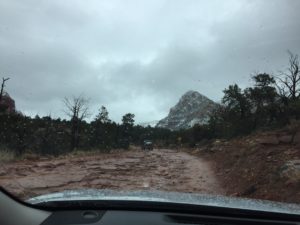

Next time when we have more time and better weather conditions we’ll explore the Petroglyphs and the many Vortexes and more restaurants.
Driving back to Phoenix to take our Delta flight home. on the way we were fortunate to see a Double Rainbow, even the end where the pot of gold is.
Thanks for ready our blog, come back again, John
Parents and kids! There’s two sides here, both with the same need. Have you told you Mom you lover her lately? When’s the last time you told your kids you love them?
Everyone needs to know they are loved! It’s so easy to say. It doesn’t have to be hard, just hug them and say it – before it’s too late!
I have things I wish I told my parents before they passed. I have things I’d like to say to my kids and hope they hear it. Listen to them, and tell them you love them.
Here’s a short video about telling someone you love them before it’s too late.